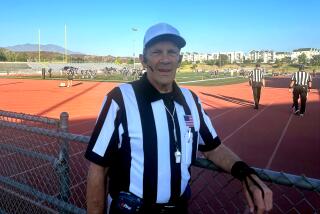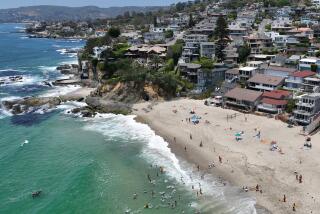Watching the Waves No Day at the Beach
- Share via
On an average, sunny summer day, as many as 80,000 people are drawn to the wide expanse of sand that is Newport Beach. Some are experienced swimmers. Many are not.
It’s up to Bill Leach and 60 other lifeguards along the 6.1-mile stretch of Newport’s oceanfront beaches to spot the difference.
“We can’t watch everybody. We look for people who look like they don’t know what they’re doing: The way they’re facing the waves, the way they’re going through the waves, whether they have fins on or not, whether they’re attached to a Boogie board, and how old they are,” said Leach, who at age 50 is one of Orange County’s senior lifeguards.
“There are certain signals that we learn to look for. It can be the way they walk, or the type of clothing they wear. If you get kids out there with big baggy pants and white T-shirts and no fins, that’s a red flag. There’s a good chance we’re going to have to do something, either get them out of the water or rescue them eventually.”
*
Leach, a Corona del Mar High School history teacher and top-ranked triathlete, returned to work as a lifeguard three summers ago after a 13-year hiatus. The Irvine resident’s previous stint as a summer lifeguard lasted 19 years, long enough for him to witness what can happen when a rescue comes too late.
“There’s a lot of rescues that every lifeguard experiences that could easily end up in a tragedy, but don’t, because you get there in time. But I’ve had some situations that haunt me: Heart attacks; mouth-to-mouth resuscitation that fails. Statistically, it’s like a police officer working the freeways. There’s going to be a certain number of crashes and there’s not much you can really do about it.”
Newport lifeguards have been especially busy this summer, with about 2,000 rescues since May. During the last few years, the city has averaged about 2,000 rescues for the entire summer season, which runs through Labor Day. Big surf and big crowds are driving the higher numbers, Leach said, but there have been no fatalities.
The hardest test a lifeguard faces is dealing with loss of life.
“Years ago, one of the guys on the tower next to me was pretty certain somebody went down. He began diving and we called it in and we all went down and started looking. A few hours later we found the body.
“He quit the next day. That’s how he dealt with it. And he was one of the best lifeguards Newport ever had. He wasn’t just some rookie.
“If that happened to me now, I would have a hard time going back. Maybe youth helps you get through that. Most of the time it’s not the lifeguard’s fault. It’s just something that happens. The person hits the bottom wrong, or they have a heart attack in the water or by the time you get to them they swallow too much water and they die of pneumonia later on.”
Leach’s first summer lifeguard assignment came at age 16, when he kept watch over the tranquil waters off Balboa Island. He earned $2.15 an hour.
“Sitting in a tower, especially on the bay, I was mostly watching little children. The rescues there tend to be jumping out of the tower and grabbing a little kid who’s fallen face first in the water. It’s kind of scary because you don’t have any warning, like a big wave coming or a rip tide developing. Working on the bay, it’s poof!, and they’re down. Either you see it or you don’t. And if you don’t, the consequences can be a very quick drowning.
“After the first year, I was on the beach. And I had the same kind of problems and conditions I’ve got now--riptides, big surf and crowds.”
*
During Leach’s second summer, a 36-year-old man suffered a heart attack on the beach.
“This is going on 30-something years ago and I can remember it like it was last week. This woman came up and said, ‘My husband’s having a heart attack.’ I ran down there and the other lifeguard was still on the beach. We worked together on him and did mouth-to-mouth and heart massage. It turned out that he’d had three heart attacks previously and his nitroglycerin pills were in the car. The paramedics got there quickly, but he died.
“It was a hard thing to relate to, so your mind deals with it in a defensive way. There were some times in dreams I visualized this guy kind of gasping for air and holding his hand on his chest and laying back and collapsing on us. But you can’t torture yourself. If you do what you are trained to do and it doesn’t work, there’s nothing else you can do.”
The tragedies may loom large in memory, but Leach said they are far outweighed by the lives that are saved. He remembers a busy summer day about 20 years ago when eight swimmers were caught in a riptide and were being pummeled by large waves. He’d already taken part in 20 rescues that day.
“This has happened to probably almost every lifeguard on the force, where you end up in these mass rescues. It was the only time that the thought flashed through my mind that I might not be able to keep my head above water, because there were so many waves that kept coming while I tried to gather the people together.”
Leach anchored the stranded swimmers to a buoy. After the arrival of several other lifeguards, the eight stranded swimmers were towed safely to shore.
“You have to respect the ocean. It’s an awesome force and it can easily overpower you. Most lifeguards have come very close to tragedy themselves. It’s something a lot of people take for granted, but it can cause real tragedy if you don’t respect it.”
(BEGIN TEXT OF INFOBOX / INFOGRAPHIC)
Profile: Bill Leach
Age: 50
Hometown: Pasadena
In Orange County: 42 years
Residence: Irvine
Family: Wife Julie; two grown and two young children
Education: Bachelor’s degree in history from UC Irvine; master’s degree in management and administration from Pepperdine University
Background: Began work as a summer lifeguard at age 16; All-America in water polo at UC Irvine; member of the first national water polo team in 1970; member of U.S. Olympic kayak team with wife Julie in 1976; won the national triathlon championship for his age group in June; will compete in world championships later this year
Currently: History teacher at Corona del Mar High School for 27 years; coaches Irvine Valley College cross-country teams with his wife; 22nd year as a summer lifeguard in Newport Beach
On the ocean: “You have to respect the ocean. It’s an awesome force, and it can easily overpower you. . . . It’s something a lot of people take for granted, but it can cause real tragedy if you don’t respect it.”
Source: Bill Leach; Researched by RUSS LOAR / For The Times
Los Angeles Times
More to Read
Sign up for Essential California
The most important California stories and recommendations in your inbox every morning.
You may occasionally receive promotional content from the Los Angeles Times.










